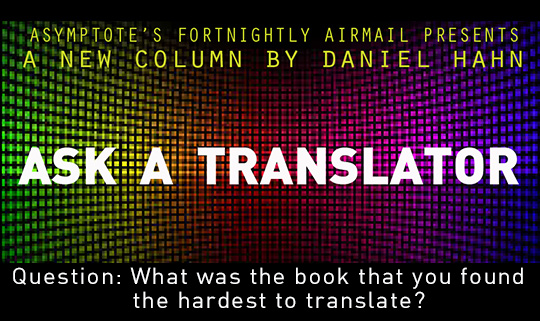Our resident translation expert, writer, and jack-of-all-trades, Daniel Hahn, is back to respond to reader questions on the fine art of translation. Today’s question comes from, once again, Romanian reader, physicist, poet, and translator Marius Surleac.
Throughout your career, what was the book that you found the hardest to translate?
I have two very different answers to this, depending on your interpretation of the question. I’ll give you one of them.
The first thing to say is that there are, of course, lots of interesting ways a book can be difficult, lots of writerly qualities to tax a translator’s re-creational skills.
A book might be, simply, hard to grasp fully in the original, hard to figure out what the hell the author is actually doing or meaning. There might be stylistic issues that don’t travel well, or at least not easily—long, nested un-English sentences, say, or effects that depend on certain idiosyncratic syntactical structures that don’t match our own. (Sorry, “certain idiosyncratic syntactical structures” is a horrible phrase. In English, at least.) There might be the distinctiveness of a voice—perhaps slangy or in a dialect—that resists recreation without feeling forced or oddly accented. There might be any number of seemingly intransigent linguistic tricks, clever wordplay, that don’t have direct equivalents in the new language and so require building entirely new acrobatic effects from scratch. There might perhaps be jokes.
(Jokes! Help!)
Each of these qualities creates its own distinctive challenge for the translator. (It’s also worth mentioning, of course, that different people find different things difficult. Poetry, anyone? Personally, I’m too much of a coward to touch the stuff.)
All constraints by their very nature must create difficulty, whether you’re translating a novel without using the letter “e” (which has been done, but not by me), or attempting to produce translation-lines that fit into exactly the same-sized speech bubbles as the original. One of my regular novelists likes to drop in song lyrics and wordplay and even on one particularly beastly occasion an anagram, which I’ve lately come to believe he does on purpose to test my mettle. (Or, you know, just to have a laugh by annoying me.)
But the thing is, I’ve always suspected that for the most part translators really like difficulty.
(Which is just as well, since anybody who decides to be a translator because they think it’s simple just hasn’t been paying attention.)
I’m about to begin work on a picture book for very young children, in which each page has a set of words that gets repeated in a slightly distorted form on the page opposite. One left-hand page shows “un papa fâché”—a picture of dad looking angry—and on the right, this has become “un papa fourchette”—a picture of dad transformed into a fork. (I can think of plenty of plays on words involving lively things that sound like “fork”, and so can you, but none of them for a book for pre-schoolers.) On another page there’s a boy on a sailboat, and in the facing page the wind has blown his towel off and we’ve gone from “un bateau à voile” (sailing boat) to “un bateau à poil” (boat in the nude). It’s going to be exceptionally hard to make this book work in English—in proportion to the tiny number of words in the book, almost certainly the biggest challenge I’ve faced—and I just can’t wait to get started. Yeah, it’s true, we translators know how to have fun.
This week we’re celebrating the 80th birthday of super-translator Anthea Bell. Her translations of the Asterix albums are among the works many of us translators most admire, for the way she succeeds in meeting their myriad challenges (having to work with the pictures, fit speech bubbles, create jokes that remain sparklingly funny and a huge amount of wordplay); but beyond our admiration I’d bet they’re the gig many translators are most jealous of, too. The satisfaction in cracking a code, or building a really funny joke, or making an utterly distinctive voice feel alive—that’s amazing.
I have healthy friends who do physical exercise, and they tell me having a really strenuous workout feels great; no, I don’t believe them either, but they assure me it’s true.
P.S. A coda: I mentioned that I had two answers to this question. There are, as I said, different ways a book can be difficult. My second possible answer relates to the book I actually, truly did find hardest to translate, which had none of the difficulties I’ve referred to. Straightforward writing, nothing tricksy, nothing hard to understand or culturally restrictive… it just wasn’t very… nice. It was a good book, certainly (bad writing is so often harder to translate than good, but those particular challenges are the subject for another post), but it wasn’t a pleasant place to be. A reader was expected to spend maybe four or five hours in this book, in a dark, cynical place with deeply unpleasant characters whose company you hate and toxic relationships and all of it so cold and cruel—a reader is supposed to be repelled by the experience, and it’s brutally effective; I, however, had to spend not a few hours but months, dragging myself back in again and again. I usually wake up in the morning excited about the work of the day ahead, but I never looked forward to this. One of the rare occasions when this brilliant occupation really felt like hard work.
Got a translation-related question for Daniel Hahn? Send it to us at askatranslator@asymptotejournal.com!
Read more Ask a Translator:

